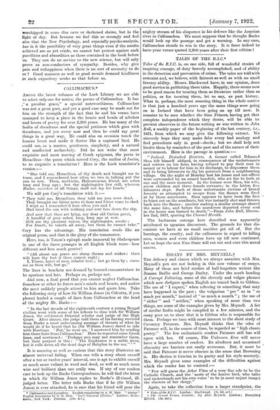CALLIMACHUS.*
AMONG the latest volumes of the Loeb Library we are able to select only one for notice, the poems of Callimachus. It has ." a peculiar grace," a special noteworthiness. Callimachus
was not a great poet, and yet a good case may be made out for
him on the strength of the fact that he and his verses have managed to keep a place in the hearts and heads of scholars and lovers of poetry for over 2,300 years. He has many of the faults of decadence and the special pettiness which goes with
decadence, and yet every now and then he could say great things in a great way.. He could also on occasion touch the human heart and make it flutter like a captured bird. He
could use, as a master, gentleness, simplicity, and a natural and unaffected melancholy. Did he not write that most exquisite and most moving of Greek epigrams, the poem to Heraclitus—the poem which moved Gory, the author of Ionica, to so exquisite a translation ? Here is the Loeb translator's version :- " One told me, Heraclitus, of thy death -and brought me to tears, and I remembered how often we two in talking put the sun to rest. -Thou, methinks, 'Halicarnasian friend, are ashes long and -long ago ; but thy nightingales live still, whereon Hades, snatcher of all things, shall not lay his hands."
We will put Cory's translation with it :-
"They told me, Heraclitus, they told me you were dead, They brought sue bitter news to hear and bitter tears to shed. I wept as I remembei'd low often you and I
Had tired the sun with walking and sent him down the sky.
And now that thou art lying, my dear old Carian guest, A handful of grey ashes, long, long ago -at rest,
• !Still are thy pleasant -voices, thy nightingales, •awake ; For Death, he taketh all away, but them he cannot take."
Gory has the advantage. His translation reads like an original poem, and that is the glory of the .transmuter.
Here, too, is Timon's epitaph made immortal by Shakespeare in one of the finest passages in all English blank verse flow
different and how much greater!
" (All about my grave aro sharp thorns and stakes : thou wilt hurt thy feet if thou comest nigh) :
Timon, hater of men,inhabit here ; but go thou by ; curse me as thou wilt, but-go."
The -lines in brackets are deemed by learned commentators to
be spurious and late. Perhaps so, perhaps not.
And now, a final proof that you cannot neglect Callimachus. Somehow or other he forces men's minds and hearts, and makes the meat unlikely people -attend to him and quote him. Take the following story of how Sir William Jones (in Calcutta, if you please) hurled a couple of lines from Callimachus at the head of the mighty Mr. Burke :-
" In tho last decade of the eighteenth century a young. Bengal civilian went with some of his fellows to cline with Sir William Jones, the celebrated Oriental scholar and judge of the High Court. After dinner, the judge told them of his having received from Burke a most unbecoming message of threats of what he would do if ho heard that he (Sir William Jones) dared to side with Hastings. ` But,' he went on, ` I answered him by sending him these lines from Callimachus.' Here he repeated some Greek lines, and continued Perhaps you may not remember them, but their purport is this : " The Euphrates is a noble river, but it rolls down all the dead dogs of Babylon to the sea." ' " It is amusing as well as curious that this story illustrates an almost universal failing. When one tells a story about oneself after a ten or twelve years' interval, one is apt to exhibit oneself as much more valiant in word and deed, as well as much more
wise and brilliant than one really was. If any of our readers care to look up the Burke Correspondence, he will find the letter in which Sir William Jones replies to Burke's ill-timed, ill- judged -letter. The letter tells Burke that if he (Sir William Jones) is ever attacked, he is sure that his friend will pour the
• Callimaehus and Lyeophron. English translation by A. W. Muir. " Aratus " English translation by G. B. Mair. "Loeb Classical Library." London : Heine- mann; New York : Putnam. ElOs. net.]
mighty stream of his eloquence in his defence like the Assyrian river in Callimaehus. We"must suppose that he thought Burke would look up the -passage and get a warning. In =Tease, Callimachus stands to win in the story. It is fame indeed to have your verses-quoted 2,200 years after their first edition 1










































 Previous page
Previous page